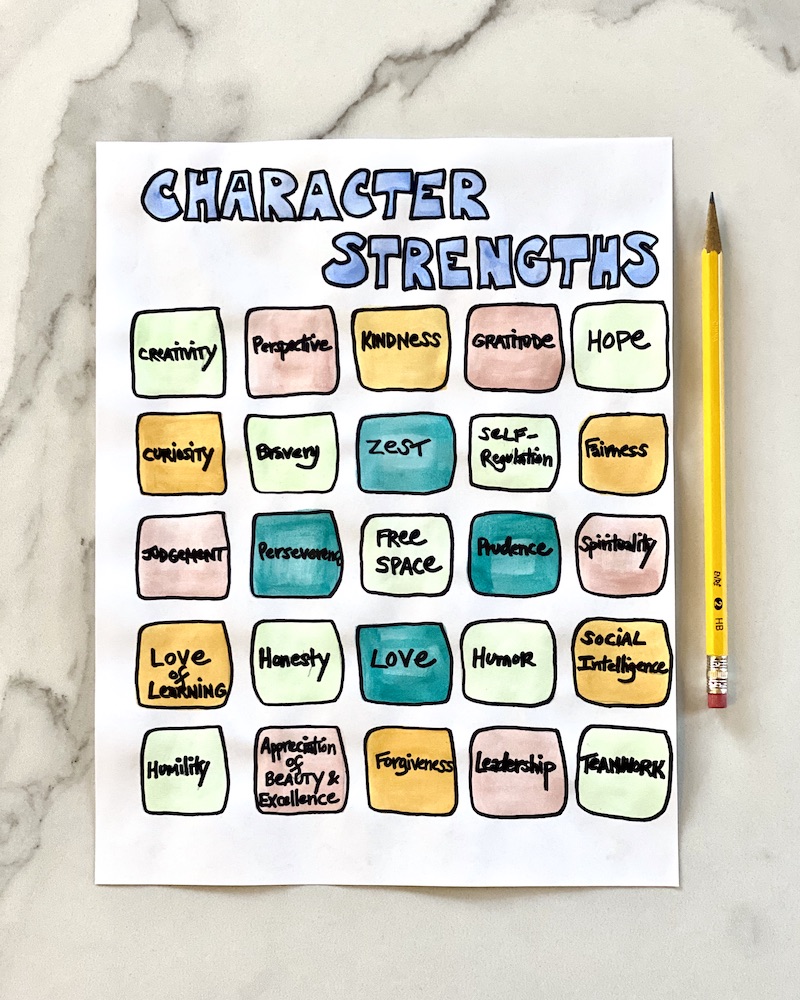Resilience– also known as psychological resilience— is understood as a person’s ability to recover from setbacks and remain relatively unruffled by what life throws at them. It’s not really something you can measure so much as feel. We all have it, but like most aspects of mental fortitude, some of us are better at it than others.
When you get stressed out or upset at one person, does it ruin your whole day? When you’re feeling worried about one thing does it bleed into other obligations?
If so, some resilience training (and general mindfulness work) can help you strengthen what I often refer to as “the resilience muscle”.
Resilience, moreover, is one of the most helpful attributes we can cultivate if we want to live a peaceful, productive, happy life. It leads to greater happiness and less time spent worrying, and it improves overall feelings of well-being for you and everyone around you. Resilience is essential for thriving!
Ultimately, that’s why we need to practice it. Like fitness itself, when we work on resilience “gains”, we see the benefits over time. Below, we explore five ways you can work on building more resilience into your everyday life.
The below list is based on Lisa Abramson‘s concepts for building a resilience mindset, which I’ve articulated further, below. I’ve also included some links to helpful, practical resources for putting each recommendation into practice. This way, you can start without any ambiguity or wasted effort.
Again, if there’s one aspect of mental fitness that can yield the most benefit when we practice it daily, resilience is it.
Fortunately, by integrating the below habits into your repertoire, you can do just that.
Let’s get into it!
***

1 – Be On Your Own Side
Silence your inner critic and talk to yourself like you would a dear friend. There’s a famous Anne Lamott quote about resilience that goes like this: “Try looking at your mind as a wayward puppy that you are trying to paper train. You don’t drop-kick a puppy into the neighbor’s yard every time it piddles on the floor. You just keep bringing it back to the newspaper.”
If that passage resonates with you deeply, I can relate. Most of us are much, much harder on ourselves than we would ever deign to be on other people. Why is that?
Some psychologists say it has to do with ego-centrism in the literal sense: we see the world through the valence of our own consciousness and thus we cannot help but be obsessed with ourselves, our reactions to our experiences, and what we feel we need to do to make ourselves happier, more successful, safer… you name it.
But really, the science of beating yourself up for no good reason might be more cultural. (And I am of the belief that it is, at least in part.)
We are constantly trained by advertising and media narratives to believe we are not good enough. Beauty magazines make us feel ugly in order to sell us products; technology proffers the idea of “speed” and “efficiency” and “instant access” to information, which underscores the idea that we never have enough time; and constant comparison engendered by the use of social media and Hollywood starlets who make everything seem glamorous encourages people who are vulnerable to this messaging to feel like they are less-than.
Whether we like it or not, the world– or at least the present culture of representation– makes it harder for us to accept and love ourselves. So, doing so takes active work.
Fortunately, mindfulness practices like Lovingkindness Meditation can help, as can positive affirmations. For those who really struggle with self-love, talking to a Cognitive Behavioral Therapist can help you understand the root of your feelings about yourself so that you can re-orient your thought patterns and learn to be easier on yourself.
For people who are very self-conscious, creating a Brag File or sleeping naked (like, actually) can also help.

2 – Choose Courage Over Comfort (This is Huge for Resilience!)
Learn how to tolerate emotional discomforts like anger, sadness, and mental fatigue. Practice the kind of emotional agility you need to ride the waves.
Why is this so difficult for us? Well, as Abramson notes, “Most people aren’t afraid of failure; they’re afraid of how failure will make them feel.”
Most people aren’t afraid of failure; they’re afraid of how failure will make them feel.
Most of us grow up with an intuitive understanding that Rome wasn’t built in a day, and that nothing worth accomplishing comes easy.
While it’s hard for us not to sometimes overlook other peoples’ shortcomings because all we can see is their highlight reel, most people intuitively know that life involves setbacks.
However, we are still afraid of these setbacks because we are afraid of how they will make us feel.
Choosing courage over comfort means confronting these uncomfortable feelings whenever they come up. Don’t run away or busy yourself!
So often, we look outwardly to soothe ourselves whenever the going gets tough. We immerse ourselves in nature, alcohol, intimate relationships, pampering, food, etc. We distance ourselves from feeling the discomfort thinking that we can avoid it completely– but it’s always waiting there for us as a result.
In these situations, the experience of resistance causes so much of the pain– and this is when we suffer the most.
When we practice simply allowing and being with what is (yes, this is also another thing you can practice in meditation) it’s like a dam is removed from a river and life can flow. Letting go of needing to fix things is important. Practice holding and being with these feelings, instead. Acknowledge that “Yup, this sucks— but that’s okay because sometimes things just suck and you’ll eventually swing right back.”
These free meditation videos can also help with this.^

3 – Take Time To Rest
Overachievers wait until they’re depleted to rest. It makes sense to reset when you’re experiencing burnout or are in the “red zone”, so to speak. But it takes much more willpower to consciously reset before you hit rock bottom, when you’re still in the yellow or green zone.
The key to avoiding burnout is to rest before you need it. In much the same way that going for checkups when you aren’t sick helps prevent disease, taking time to rest is preventative medicine for the mind. Basically, instead of resilience, it should be called rest-silience. (<— Sorry for this terrible pun; that’s a Dad Joke for another time.)
“Resting”, moreover, can also take several different forms. It might mean choosing not to answer emails at least an hour before bed– or better yet, turn off your phone completely during that window of time.
Resting could also mean planning to cook dinner with a partner, scheduling a workout with a friend, or booking a non-refundable massage or spa treatment so that you can’t cancel it last minute.
Generally speaking, it’s a good idea to schedule rest and relaxation time. Otherwise, if it doesn’t get scheduled, it won’t happen.
Related: Spark Your Own Joy With This Epic Peanut Butter Taste Test.

4 – Connecting With Your Why
Always remember to check in with what drives you. This motivation can get you through tough times, and it’s a universal tenet of meaningful work-life balance. This principle is in part why I always recommend that anyone who is soul-searching take the VIA Personality Test, which can help you connect with your passion and purpose.
The VIA Personality Test, which you can take at the link above, is the world’s first research-backed personality test that defines your principal character strengths in clear, plain language. It’s a fun way to get to know yourself better.
The test consists of several detailed questions about your thought process, your worldview, and an honest assessment of how others see you.
The 24 character strengths that the VIA test ranks can be broken down into six umbrella categories– Wisdom, Courage, Humanity, Justice, Temperance, and Transcendence– and all character strengths are fulfilling, distinctive, and valued on an institutional level within society.
They’re also not traits that can diminish others– meaning that they’re aspects of your personality that tend to lift other people up and make them feel good.
When we understand our “Why”, we are better able to understand our motivations for doing what we do in life and how we spend our time– personally, professionally, and emotionally.
Your character strengths also inform a kind of subconscious mission statement that can become a guiding principle in your life. Knowing what these are can be a powerful way to ground yourself in tumultuous times.

5 – Savoring The Good
When something goes well, celebrate it, no matter how small. Most of us have heard of gratitude journaling– keeping a notebook in which to write down three or so things we’re grateful for each day. But fewer of us really understand how to put gratitude into practice in everyday life.
For this, I always defer to the famous Kurt Vonnegut quote: “I urge you to please notice when you are happy, and exclaim or murmur or think at some point, ‘If this isn’t nice, I don’t know what is.'”
^ To me, it really is as simple as that. That’s how you savor the good.
Whenever you’re feeling good, moreover, take a split second to acknowledge it. Acknowledging the good helps with resilience just as much as acknowledging the bad.
When we bring awareness to the pleasantness of the present moment– as opposed to worrying about the past or fretting about the future– we often realize that where we’re at, right now, isn’t such a bad place to be. 🙂
***
Related: Try This Genius Hack For Calming Spiraling Thoughts.

Leave a Reply